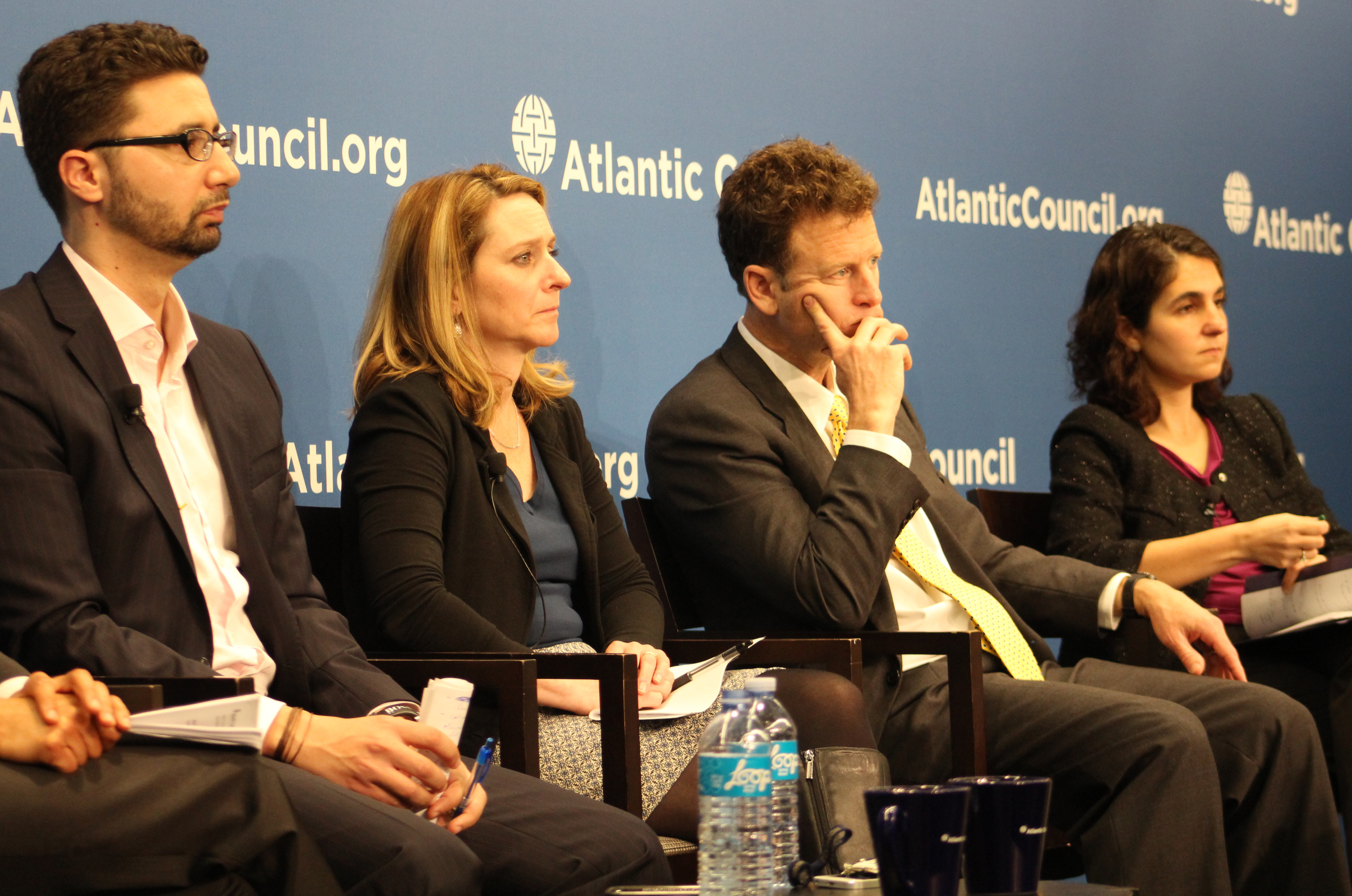 A sustainable US Middle East policy should include closer cooperation with longstanding allies—including the United Kingdom and France—but also a strategic dialogue with adversaries such as Russia and China, according to Bilal Y. Saab, a Senior Fellow for Middle East Security at the Atlantic Council’s Brent Scowcroft Center on International Security.
A sustainable US Middle East policy should include closer cooperation with longstanding allies—including the United Kingdom and France—but also a strategic dialogue with adversaries such as Russia and China, according to Bilal Y. Saab, a Senior Fellow for Middle East Security at the Atlantic Council’s Brent Scowcroft Center on International Security.
In light of the United States’ shifting global priorities and defense budget cuts, the Arab Spring, and the rise of the Islamic State of Iraq and al-Sham (ISIS) in the Middle East, the United States “can do much more with our allies in a much more formal fashion,” said Saab.
“It’s time to update the hub and spoke model of engagement we’ve relied on since the seventies,” he added.
Saab, who is Chairman of the ISIS War Game Series and Gulf Policy Working Group at the Council, is the author of a new report: “After Hub-and-Spoke: US Hegemony in a New Gulf Security Order.”
Saab spoke in a panel discussion on April 29. He was joined by Kathleen Hicks, Senior Vice President and Henry Kissinger Chair at the Center for Strategic and International Studies, Mara Karlin, Deputy Assistant Secretary of Defense for Strategy at the Department of Defense, and Michael O’Hanlon, Director of Research, Foreign Policy at the Brookings Institution. Michael Singh, Senior Fellow at the Washington Institute for Near East Policy, moderated the discussion.
Singh noted the collapse of the regional security architecture in the Middle East and that the United States has been in a period of “strategic transition,” which he said started with 9/11 and the resulting need for the United States to focus on counterterrorism.
Saab, while advocating “closer collaboration and consultation with some old longstanding French and British allies,” noted that these countries have “made some very serious decisions to return to the region and to amplify their military and political presence” in the Middle East. Such cooperation offers a “much more sustainable US strategy to police one of the most important east-west highways in the world,” he added.
Russia and China have also stepped up their engagement in the Middle East as is evident from Russia’s support for Syrian President Bashar al-Assad and China’s reliance on Middle Eastern oil.
Meanwhile, the Obama administration has sought to reassure its allies and partners in the Arab Gulf where leaders are worried about the regional repercussions of the nuclear deal with Iran. As part of this effort, US President Barack Obama hosted leaders from Gulf Cooperation Council (GCC) member states at Camp David in May of 2015 and participated in a similar summit in Riyadh on April 21. The GCC includes Bahrain, Kuwait, Oman, Qatar, Saudi Arabia, and the United Arab Emirates.
At a time when regular security structures in the Middle East are changing, there is an increased need for a cost-effective approach to multilateral actions toward common security goals. Karlin said the role of third parties, whether the United States’ European allies or competitors like Russia and China, involves whether the parties view the threats the same way, an “obsession” with opportunity costs, and the idea of burden sharing within the region. This last component is of particular interest in light of Obama’s recent interview with the Atlantic in which he referred to some US allies, including Arab Gulf countries, as “free riders.”
For Hicks, burden sharing is an essential part of Saab’s report’s “sustainable multilateral” strategy because as budgets are constrained, there is an increased need for wiser spending and collaboration in the common security interest.
“We have a geopolitical environment that is at odds, I believe, with the amount of resources we are prepared to spend,” she said of US defense spending.
Threat perception is a major factor in partnerships as the United States shares at least two of the Gulf countries’ major concerns: ISIS and Iran, according to Karlin. She said European allies perceive threats in the region similarly, with the added pressure of the migration crisis and domestic counterterrorism efforts. Russia, however, has exhibited different interests and actions in the region, particularly in Syria.
The Russian military overtly stepped into the Syrian war in September of 2015 when it started attacking Assad’s enemies. O’Hanlon said Russia was able to take advantage of this opportunity in Syria because of the United States’ initial strategy not to get involved in the war.
O’Hanlon called Obama’s actions in Syria the biggest failure of American foreign policy in the past five years. He recommended lower standards for success in Syria moving forward.
Tensions in Syria between the United States and Russia may continue if France and the United Kingdom are to take a more active role in the region, along with the United States, said Saab. The history of colonialism of France and the United Kingdom in the Arab Gulf requires both countries to think more broadly about the idea of reform in the region. Saab emphasized that it is important not to dictate to Gulf countries what should be done, rather to have a conversation about security interests, with the United States organizing and leading such an effort.
Karlin said Saab’s call for reform has a duality of complexity: it is simultaneously the hardest and most important time since the pro-democracy Arab Spring uprisings in 2011 to have reform. Though the current political situation might call for reform, the United States, France, the United Kingdom, and the GCC states will all have to work together to achieve it, she said.
Danielle Leopold is an intern at the Atlantic Council.
